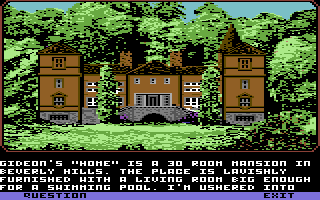Retro Replay Review
Gameplay
Mean Streets delivers a unique blend of classic point-and-click adventure mechanics with cinematic detective work. Players guide Tex Murphy through icon-driven environments, examining clues, collecting evidence, and engaging in dialogue trees that influence the outcome of investigations. Rather than relying on intricate object-based puzzles, the game emphasizes logical deduction and conversational tactics, challenging players to piece together fragmented information and outwit suspects in tense exchanges.
(HEY YOU!! We hope you enjoy! We try not to run ads. So basically, this is a very expensive hobby running this site. Please consider joining us for updates, forums, and more. Network w/ us to make some cash or friends while retro gaming, and you can win some free retro games for posting. Okay, carry on 👍)
Interrogations are the heart of the gameplay experience, as Tex must decide whether to coax the truth with carefully chosen questions or resort to bribes and intimidation. Characters react differently based on Tex’s approach, making diplomacy a viable—and sometimes preferable—path to progress. While some encounters can escalate into brief combat sequences, true success often comes from reading body language in digitized photo portraits and selecting the right line of questioning to expose lies.
To add variety, Mean Streets incorporates flight simulation and side-scrolling action sequences. Piloting the sleek Lotus Speeder between West Coast cities offers a dynamic break from detective work, complete with instrument panels and real-time hazards. Meanwhile, on-foot action requires Tex to fend off thugs in run-and-gun segments, injecting a pulse-pounding challenge that keeps the pace brisk and offers a stark contrast to the cerebral core of the game.
Overall, Mean Streets strikes a deliberate balance between its adventure roots and arcade-style interludes. Each gameplay element reflects the seedy 2033 world, from high-speed chases across neon skylines to shadowy back-alleys where information is as valuable as ammunition. The result is a varied, immersive experience that keeps players on their toes as they uncover the dark secrets of Project Overlord.
Graphics
Visually, Mean Streets marries a film noir aesthetic with early ‘90s digitized photography, creating an intriguing retro-futuristic atmosphere. Character portraits are rendered as black-and-white stills, lending authenticity to the hardboiled detective vibe. Though primitive by modern standards, these images convey emotion and suspicion through subtle facial expressions and moody lighting.
The game’s static backgrounds paint a gritty vision of a dystopian West Coast in 2033. Neon signs flicker against rain-slicked streets, while deserted docks and labyrinthine university halls evoke tension and intrigue. These environments are richly detailed, encouraging players to scour every pixel for hidden clues and secret exits.
While the low-resolution art may feel dated, the creative use of color, contrast, and shadow sells the world’s oppressive underbelly. Animations in flight and side-scrolling segments are smooth enough to maintain immersion, and the occasional parallax scroll effect amplifies the sense of depth. For fans of vintage aesthetics, Mean Streets’ visuals are part of its enduring charm.
Story
Mean Streets plunges players into a twisted murder mystery when private detective Tex Murphy is hired to investigate the death of a university professor. Uncovering evidence that ties the victim to Project Overlord—an illicit government program designed to remotely control human minds—Tex soon discovers that he is up against far more than a simple homicide. Each revelation peels back a new layer of conspiracy, painting a chilling portrait of power unchecked.
The narrative’s cast of suspects includes the dubious head of British intelligence, a ruthless surveillance magnate, and the bereaved daughter of the murdered professor. As Tex travels between San Francisco, Los Angeles, and other locales, players witness shifting alliances and double crosses that keep the mystery unpredictable. Key plot points hinge on persuasive dialogue, rewarding players who pay attention to nuance and revisit earlier clues with fresh insight.
Rooted in hardboiled detective fiction, the story weaves film noir tropes—damsels in distress, underground crime rings, moral ambiguity—into a sci-fi framework that amplifies the stakes. The combination of futuristic gadgetry and classic gumshoe tropes makes for a compelling narrative cocktail, as players question whether any character can be trusted, and whether the ultimate villain lies within one of Tex’s closest contacts.
Overall Experience
Mean Streets stands as a landmark title that seamlessly blends investigative gameplay with arcade-style action and flight simulation. Its atmospheric presentation and engrossing storyline make it a must-play for fans of detective fiction and retro gaming. Even decades after its release, the game’s blend of deduction, dialogue, and adrenaline-pumping sequences ensures it remains memorable.
While modern gamers might be surprised by the pacing—leaning heavily on conversation and clue analysis—the payoff is a richly layered mystery that rewards patience and intellect. The side missions and city-to-city travel add variety without derailing the core narrative, and the film noir visuals bolster the sense of immersion. This is an adventure that demands full attention, inviting players to live out the role of Tex Murphy in his seedy 2033 playground.
In the end, Mean Streets offers an experience that is equal parts cerebral and kinetic, tying together diverse gameplay elements with a cohesive vision. Its enduring appeal lies in the authenticity of its world-building and the thrill of unraveling a high-stakes conspiracy. For those seeking a vintage adventure with a futuristic twist, Tex Murphy’s first case remains as captivating today as when it first cast its shadow over the mean streets of tomorrow.
 Retro Replay Retro Replay gaming reviews, news, emulation, geek stuff and more!
Retro Replay Retro Replay gaming reviews, news, emulation, geek stuff and more!









Reviews
There are no reviews yet.